Text
While I'm here I want to talk about how Epic characterises Odysseus, and why criticisms that Jay “gives him a conscience” misunderstand both the Odyssey and what Epic is actually doing.
First: the claim that Homer’s Odysseus didn’t feel guilt or grief just isn’t true. He does express regret, sorrow, even shame, just rarely in the moment, and rarely in overt ways. But the man weeps constantly. He breaks down when hearing songs of Troy. He mourns his fallen men. He carries the weight of what he’s done, even if he couches it in calculation and cleverness.
And when people say Jay’s version of Odysseus is somehow "softer" or overly moralized, they’re not only flattening Homer’s character — they’re missing the thematic project of the musical entirely.
Jay isn't writing a story where Odysseus learns "to be ruthless and let go of mercy." That’s one thread. But if we take it as the core arc, then yes, you might reasonably ask: why does he hesitate to kill now, when the Iliad Odysseus did far worse without flinching?
The answer lies in "Just a Man," the linchpin of the musical and a crucial catalyst for Odysseus’ internal arc. In it, he’s asked to kill an innocent child, and he does. But not before hesitating, asking: "Will these actions haunt my days? / Every man I've slain / Is the price I pay endless pain?"
The killing of the infant, possibly the darkest moment in the musical, comes as he says, “I’m just a man,” right after asking, “When does a man become a monster?” He drops the baby as he says it. We’re not meant to believe he’s not a monster. We’re meant to see that he doesn’t want to believe it.
That moment haunts the rest of the show. He didn't become ruthless when he dropped the baby, he already was; war changed him so completely that at the end of it, he was able to kill a baby that looked just like the son he left 10 years prior, and that terrifies him.
And the fear doesn’t go away. In "Open Arms," Polites is essentially telling him that war has changed him, and he carries it with him even now, after it's over. That truth unsettles Odysseus so deeply (who in the song prior is literally running "full speed ahead" away from his actions, away from war, convinced he can just get home and leave it all behind) that a goddess has to intervene to steady him.
When he faces the Cyclops, he tries to justify the violence: "It's just one life to take / And when we kill him, then our journey’s over." But the tone is clear: this is self-reassurance.
And Odysseus does this a lot in Epic! There’s a pattern of him trying to reassure himself and his crew that they’re almost there, that if they can just get through this trial, they’ll be home. He insists that their journey is nearly over again and again, that their families are still waiting, that everything will be fine, that they can still make it home.
But these aren’t promises, they’re hopes dressed as certainty. He has no real reason to believe any of it. It doesn’t matter. He says it anyway. Because if he stops believing it, even for a moment, the weight of what he's done, and what he's become, might crush him (we see this play out explicitly in both "The Underworld" and "Love in Paradise"). These aren’t just reassurances. They’re quiet, desperate lies. Mostly to himself.
Even delirious with exhaustion, he clings to this idea: "So much has changed / But I'm the same, yes, I’m the same."
But he isn’t. And he knows it. Odysseus is afraid the war will never end, not because of geography or gods, but because he’s afraid the war has already changed him beyond return. And that is one of the major ideas we can take from the Odyssey. As Emily Wilson observed, the long journey home is not just physical, it’s existential. The question isn’t just can he return, but who will return if he does.
So when Odysseus later embraces brutality, when he says, "Ruthlessness is mercy upon ourselves / And deep down I know this well," it’s not a turning point. It’s a confession. He’s admitting that this capacity for violence has always been there. And it’s Penelope’s danger that makes him stop pretending otherwise.
That’s the true arc: not from man to monster, but from denial to acknowledgment. Not the loss of conscience, but the unbearable weight of it.
And that’s why it matters that it’s Penelope who is in danger when he finally stops clinging to who he used to be. It’s for her sake that he embraces what he’s become. And in that moment, he knows she might not love him anymore. He chooses the path that will lead him home no matter what anyway.
598 notes
·
View notes
Text
YALL. Holly Black has a list of resources she's used for writing her books on the fair folk. I'm OBSESSED. I love her work and world building. it's so true to the heart of faeries
19K notes
·
View notes
Text
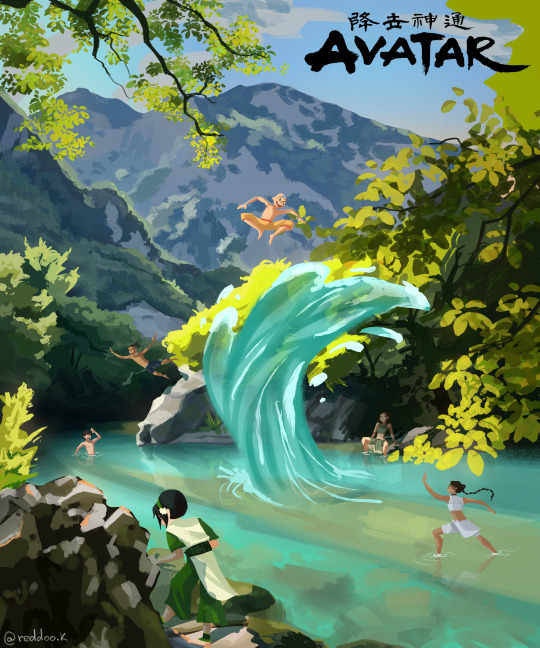
Big ATLA piece!!
I've been watching the series while doing schoolwork lately and it felt comforting, so I wanted to make a scene where the gaang was just having a good time jsjs
I took the opportunity and did a forest study from a photo for the background, and I am so proud of it UvU
also heres a 1 minute timelapse for anyone interested hehehe
4K notes
·
View notes
Text

Agony of a Witch. Eda's curse theme always cuts to the core
5K notes
·
View notes
Note
What if there was a cow that could fly?
um. uhh um. fat bumbalbee
37K notes
·
View notes
Text










Cymru Queers for Palestine disrupting and leading the Cardiff Pride Parade, Saturday 22nd June by Hannah Tottle
35K notes
·
View notes
Text
205 notes
·
View notes
Text
Why am I seeing almost nothing about the Maldeen?? The Freedom Flotilla with Greta Thunberg and 11 other activists on board, carrying humanitarian aid to Gaza such as food and baby formula was just intercepted by the IDF. Drones sprayed a white substance on the ship and the IDF detained everyone on the ship. Communication has been lost.
Photo from June 9th, 2025

DO NOT stay silent about this! Free Palestine! 🇵🇸
695 notes
·
View notes
Text


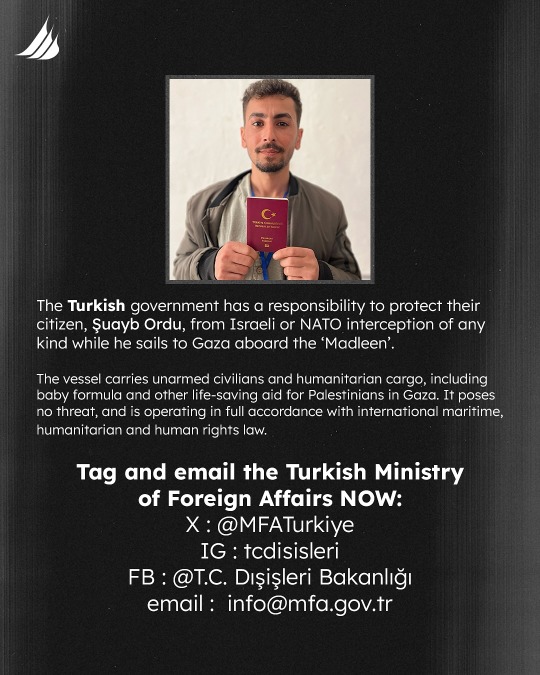
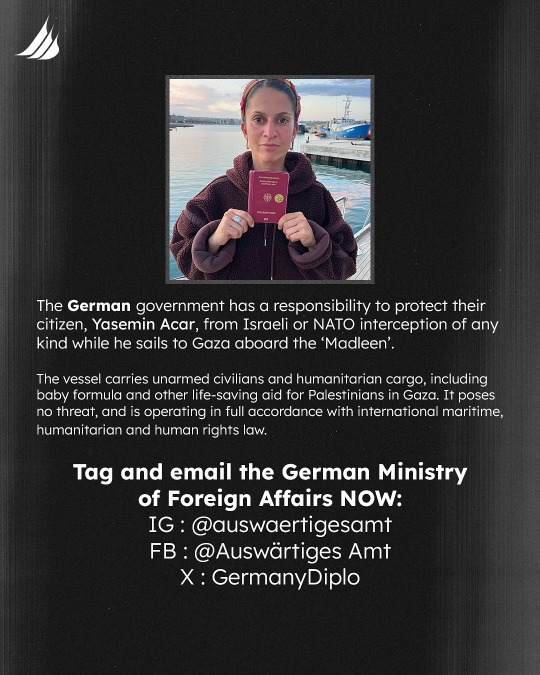
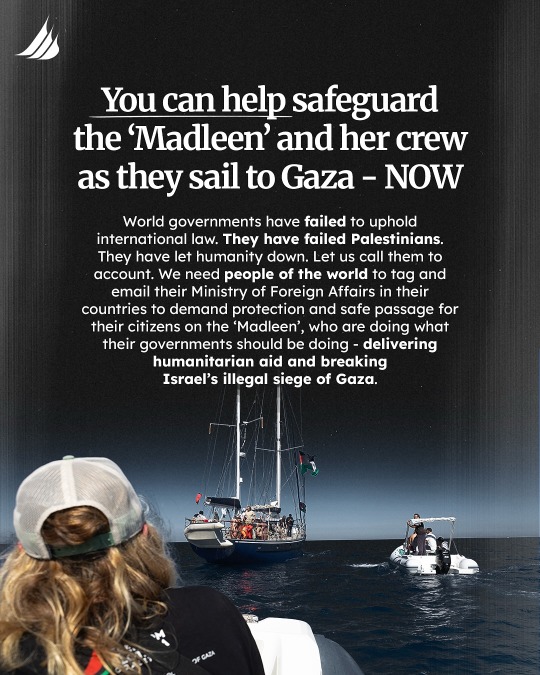

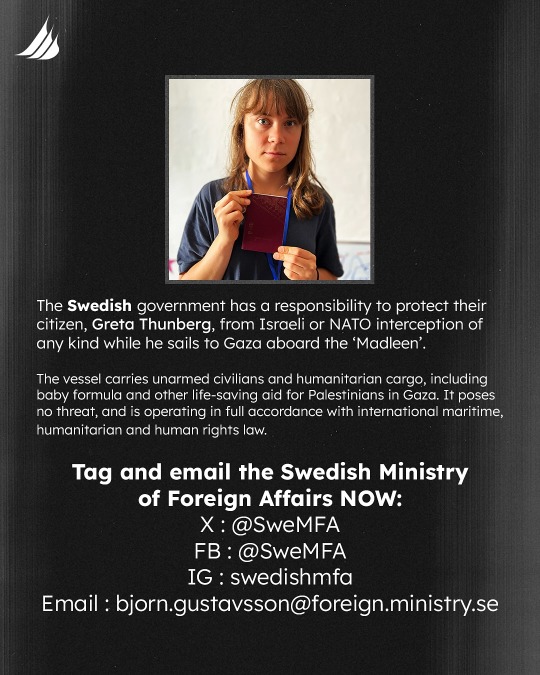

#Repost @gazafreedomflotilla
After drones repeatedly hovered over the ‘Madleen’ last night, we need people of the world to help tag and email their foreign ministry. The volunteers aboard are delivering life-saving aid to Gaza. They are unarmed, carrying only food, medicine, and baby formula, and acting fully within international law.
It’s time for world governments to step up. Demand they protect their citizens aboard the ‘Madleen’ and stop enabling Israel’s war crimes.
Safe passage is a legal obligation, and a moral one.
USE THE LINK BELOW TO EMAIL EACH MINISTRY OF FOREIGN AFFAIRS!!
416 notes
·
View notes
Text
greta thunberg and 11 others on the flotilla carrying aid to gaza have been kidnapped by the israeli government in international waters.
20K notes
·
View notes
Text
‘If you see this video, we are being intercepted and kidnapped’
Greta Thunberg has shared a pre-recorded video appealing for international help.
“My name is Greta Thunberg, and I am from Sweden,” Thunberg said in the video recorded on board the Madleen, before tonight’s events.
“If you see this video, we are being intercepted and kidnapped in international waters by the Israeli occupational forces, or forces that support Israel,” she said.
“I urge all my friends, family and comrades to put pressure on the Swedish government to release me and the others as soon as possible.”

17K notes
·
View notes
Text


a family can be you, your soulmate, your trauma bonded uncle, an ugly cat, and some geese
5K notes
·
View notes
Text
Are you 🫵 pissed off about the Lilo and Stitch monstrosity remake? Do you want to know how you can actually make a difference in supporting the people and ecosystems of Hawaii?
Tourism is a big issue in Hawaii (which the remake got rid of the original's commentary on because it makes foreigners look bad). I'm not gonna promote it, BUT I know that realistically, thousands of people arrive here every single day by the airplane-ful. And the majority of them aren't educated on the socio-cultural and economic impacts of tourism. SO, I'm making this post in an effort to educate visitors. If you or someone you know is visiting or moving to Hawaii (whether by circumstances in or out of your control), here are some suggestions on how you can give back!
You can donate to the Hawaii Community Foundation, which has been instrumental in giving aid to the displaced community of Lahaina after the Maui wildfires in 2023. They also provide scholarships to students of under-represented communities.
If you're interested in visiting Kualoa Ranch, you can do their Mālama Experience where you get your hands dirty giving back to the ‘āina (land)!
There are other organizations you can join to volunteer with, too, like Kupu and Mālama Maunalua. Check them out; maybe you can help with a beach cleanup or plant native trees! These are both non-profit organizations that accept monetary donations.
Visit the Bishop Museum to learn about Hawaiian history and culture! They also have events focused on sustainability and conservation.
If you're visiting Hilo on the Big Island, go visit the Laulima Nature Center! They're a non-profit aimed at protecting Hawaii's native species, and they even have an online store that ships to the US mainland and internationally! (After I post this, I'm gonna head on over and get myself a manu o Kū pin ♡)
A few other tips I have:
DO: Respect the locals' homes. Several beaches and hiking trails have access points in residential areas. Please be mindful to keep your voices down when passing by, and park ONLY in designated parking areas.
DO: Wear reef-safe sunscreen! Sunscreens containing oxybenzone and octinoxate are banned in Hawaii because they are known to damage coral reefs.
DON'T: Approach wildlife, particularly honu (sea turtles) and 'īlio holo i ka uaua (Hawaiian monk seals). Stay at least 10 feet (3 meters) away from turtles and at least 50 feet (15 meters) away from monk seals. If you see someone harassing animals, report them to the statewide NOAA Marine Wildlife Hotline: (888) 256-9840. You can also contact the Hawaii State Department of Land and Natural Resources.
DON'T: Collect sand, rocks, or other natural items to bring home with you. This is to protect the ecosystems and also out of respect for Kānaka Maoli (Native Hawaiians), who have cultural beliefs regarding lava rocks in particular. Taking lava rocks is extremely disrespectful.
DON'T: Litter! Please throw away your waste in proper trash cans. If you see a bin that says "ʻōpala," that's a trash can!
Many Kānaka Maoli (Native Hawaiians) are moving to the US mainland because the cost of living in Hawaii has been driven up so high (because of people moving here), they can't afford to live in their ancestral home. So, if you are going to visit or move to Hawaii, please:
- Make the effort to support local businesses, especially those owned by Native Hawaiians!
- Educate yourself and your loved ones about actual Hawaiian culture!
- Try Hawaiian food, like poi!
- Learn some Hawaiian words and don't be afraid to ask how to pronounce words correctly!
- Donate to a food bank!
- Watch films and read books written by Native Hawaiians!
My hope is that whoever sees this post will use it to educate themselves, their friends, and their families who are considering visiting.
My background is in sustainability and the environment, so that's what I know to suggest off the top of my head. If any Kānaka Maoli read this post and have suggestions to add, please do!
50K notes
·
View notes



